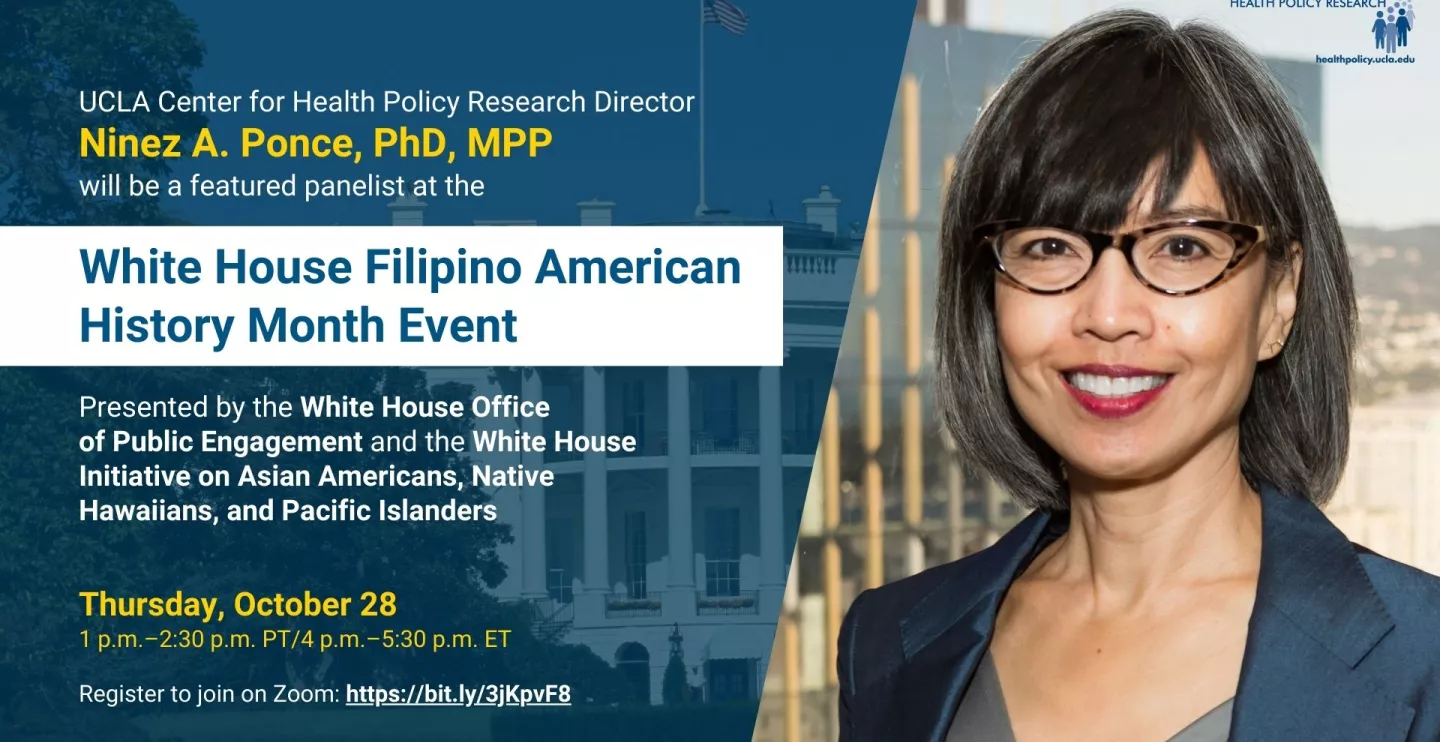Ninez Ponce featured at White House Filipino American History Month event
Ninez A. Ponce, director of the UCLA Center for Health Policy Research and a professor of health policy and management at the UCLA Fielding School of Public Health, joined government, community, health, business, and other Filipino leaders from across the country at the White House Filipino American History Month event on Thursday, October 28
Media Contact:
UCLA CHPR Communications Team
Ninez A. Ponce, director of the UCLA Center for Health Policy Research and a professor of health policy and management at the UCLA Fielding School of Public Health, joined government, community, health, business, and other Filipino leaders from across the country at the White House Filipino American History Month event on Thursday, October 28.
“Filipino Americans contribute significantly to our health care workforce and have been disproportionately impacted throughout the COVID-19 pandemic, and yet these disparities are often masked due to a lack of adequate data on AA and NHPI communities,” said Krystal Ka'ai, executive director of the White House Initiative on Asian Americans, Native Hawaiians, and Pacific Islanders, during her introduction of Ponce, who was selected to provide remarks on health.
A “health data revelator,” Ponce outlined her three key roles: data producer, data equity advocate and coalition and pipeline builder.
First, through her work as principal investigator of the California Health Interview Survey, Ponce produces disaggregated race and ethnicity data that has provided scholars, advocates, legislators, and other decisionmakers the evidence to address the unmet needs of Filipino Americans.
“Filipinos are overrepresented in the provision of health and long-term care services in the United States,” said Ponce. “Our [UCLA] Center for Health Policy Research has provided technical assistance and examples for other federal, state and local health surveys to follow the values that we have in California with CHIS.”
A data equity advocate, Ponce helped develop the first CHIS in 2001 and has led numerous pioneering efforts in multicultural survey research, including measures of racial/ethnic identity, acculturation, generational status, and discrimination. She also devised the rationale and implementation of Asian ethnic oversamples and the cultural and linguistic adaptation of the survey in Chinese (Cantonese and Mandarin), Korean, Vietnamese and Tagalog. Today, CHIS is a national model for data collection on race/ethnicity and on the meaningful inclusion of Asian Americans and Pacific Islanders.
Ponce, who has conducted research on the disproportionate toll of COVID-19 on various communities since the start of the pandemic, pointed to how a lack of data disaggregation in health systems, including aggregating Asian Americans together, has masked health disparities and contributed to health inequities. Through her recent research, which has been published in JAMA Health Forum, Ponce has found that Filipinos, which represent a large proportion of health care workers, have been disproportionate impacted by COVID-19, and advocates for Filipinos to be considered a priority population.
“It’s important to stress that as we are losing Filipinos in the front lines of fighting the pandemic, that we were simultaneously lost in the data, and consequently lost in policy priorities,” she said.
Lastly, Ponce emphasized the importance of building coalitions to advance Filipino American health, including the Filipinx/a/o Community Health Organization, a multigenerational, multidisciplinary collective of Filipino leaders, which Ponce co-founded to continue the fight for visibility in data.
“When the data is available, to not just let it sit on a shelf, but to generate the insights on Filipinos and connecting these insights to informing policy so we can ultimately address the unmet need and advance the health and well-being of Filipino Americans,” said Ponce.
Hosted by the White House Office of Public Engagement and the White House Initiative on Asian Americans, Native Hawaiians, and Pacific Islanders, the event featured Air Force Undersecretary Gina Ortiz Jones, San Antonio Mayor Ron Nirenberg, California Attorney General Rob Bonta, various Filipino American Biden-Harris appointees, and other community leaders in celebration of Filipino changemakers in the United States.
A recording of the event can be viewed on the White House Initiative on Asian Americans and Pacific Islanders' YouTube page.














